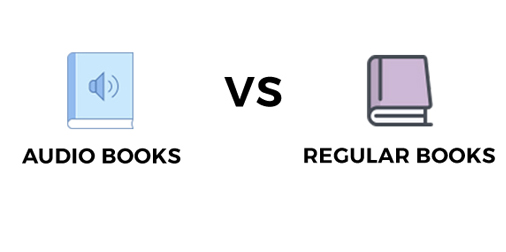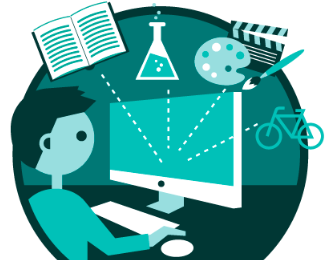Why audiobooks are better than real books

People always look down on audiobooks. They’re seen as “not really” reading. As an avid reader of physical books as well as an audiobook consumer, I feel it is my job to defend the audiobook format, and give my perspective on why I think that not only are audiobooks just as good as reading, but in some cases I believe they are even better than real books.
Before I begin, let me just say that I still love to read, and I think that reading physical books is a timeless endeavor that will never lose their appeal, no matter what other mediums come up. I love to read physical books, and I do agree there is a certain Je Ne Sais Quoi to reading a physical book you can touch, that you just don’t get from audiobooks.
My Story
Since I was young, my mom used to take me to the library several times a week. As a child, I would often read dozens of books a month. My favorites were the classics (Around the World in Eighty Days, Treasure Island, Twenty Thousand Leagues Under the Sea, Lord of the Rings), Mystery Series (The Hardy Boys, Encyclopedia Brown) and young fiction (Henry Huggins, The Boxcar Children, Goosebumps, Animorphs, Harry Potter).
As I grew older though, for whatever reason I began to read less. As I grew into adulthood though, I found myself longing to go back to a time where I could read more often. I even started a few book clubs. However, a lack of time and other commitments would always seem to get in the way of my desire to read as much as I would have liked, until I came across audiobooks.
The biggest audiobook myth
The most common objections I hear related to audiobooks are that they are not really reading, and you can’t benefit from them in the same way as reading. While I agree that the type of book you want to read makes a difference and some formats are impossible (for example books laden with technical research and graphs), I found that most formats work perfectly well and 99% of the popular books people actually read work well in the audiobook format. In fact, even some neuroscience research on the topic has found that there is no difference to our brains when we read versus listen to the same information [link to the study].
The fact that audiobooks are read by someone can also be seen as a benefit. For example, non-fiction books are usually read by the author (so you can easily understand what they are trying to say and their point of view) and with fiction they are usually read by professional voice actors. For example, 2 of my favorite fiction audiobooks are Sherlock Holmes and The Hitchhiker’s Guide to the Galaxy, both read by Stephen Fry. In a way, listening to those 2 works (even though I also read the physical books in the past) allowed me to appreciate them in a new way. It reminds me of how people used to consume entertainment in the days of radio with stories done as performances.
What’s great about audiobooks is that you can listen to books without having to have fully focused dedicated time to concentrate on reading. As a result, you can now listen to books while driving, going for a walk or even doing household chores. For me, that means that I can supplement my “normal” reading, with audiobooks when I have the chance.
I know for a fact I’m not the only one and that there are millions of others that are now reading more than they could have otherwise, as a result of audiobooks.

When it comes to audiobooks, I do some have some advice with regards to how to get the most out of your experience.
How to read a book
Before I get into the methods I recommend to consume audiobooks, let’s first look at how we should be reading books in general to get the most out of them (either to learn, improve our lives, or just be entertained).
The seminal work on the topic of reading well is How to read a book by Mortimer J. Adler, a dense book that goes into detail on how to critically read a book (two great summaries on this are by Farnam Street and Ness Labs).
The main idea behind it is that there are levels to reading.
- Elementary Reading: Which is the basics mechanics of knowing how to read and understanding what you’re reading.
- Inspectional Reading: Which is either skimming through a book, casually reading a book to get the overall idea the author is trying to convey, or understanding a book enough to give a quick summary.
- Analytical Reading: This is where critical reading comes in, where you look at the author’s voice, understand their arguments and come to your own conclusion to their validity. This is where you go beyond normal note taking on a book, and draw your own conclusions from the work.
- Syntopical Reading: The final stage is bringing together your opinions from different sources (different books), and coming to a full overall understanding of a topic, while placing the book you just read in that framework.
What Adler recommends for books that are worth it, is to read a book either more than once (taking in different reading levels at each stage), and take notes while reading to cement your understanding.
Levels of reading an audiobook
Now let’s look at how audiobooks fit into Adler’s framework. The first 2 stages (elementary reading, and inspectional reading) are perfect for audiobooks! That is because audiobooks make it easier to:
Quickly Skim: It allows you to easily get through books (even speed up at parts, listening at 2x or higher). This helps you see whether a book is worth reading critically in the first place (if you deem a book as worthy, you can choose to actually read it later on or listen again more intently).
Understand the Author’s Voice: One of the key areas that Adler recommends to focus on it a book is the author’s voice. That’s perfect for audiobooks since as I mentioned above, they are often read by the author themselves, which not only allows us to literally listen to their voice, but also better understand their context since we can hear the verbal cues and emphasis that an author places on certain concepts.
How to read an audiobook well
Now you may be thinking, what about the 2 more advanced stages of reading (Analytical and Syntopical reading)? This is where I must admit that audiobooks are at their weakest. It’s hard to critically read an audiobook, since you are usually not fully focused and it’s hard to take notes (since when you listen you probably aren’t free to write anything down). However, there are some tips I have to critically read an audiobook that have helped me.
- Speed up: I can read a lot faster than I can listen. But, that’s only if someone is talking in normal speed. One of my favorite things about audiobooks is you can listen at a higher speed, which mimics the speed at which you can read, for me that’s between 1.5x and 2.5x for most narrators (depending on how fast the narrator talks, and the subject of the audiobook). If you tried this in the past, but didn’t have a good experience I recommend to start listening at 1.1x or 1.25x and then slowly build your way up as your brain gets used to it. I got so used to this now, that I now have to speed up most videos I watch online (here is a great Chrome plugin that works on all websites).
- Listen multiple times / repeat: The next technique I use is to read (or listen) more than once. That means that if there is a certain section I wasn’t paying attention to (I zoned out or got busy while I was listening), I’ll just play it again. I may even often go back and listen to the entire book again, if I feel it’s worth it and I want to cement what I learned.
- Use the bookmark feature: The next technique I recommend is to use the bookmark feature. The two most popular audiobook platforms (Audible and Scribd), both have this feature built in where you can create bookmarks for sections of the audiobook you find interesting (it saves the timestamp a few seconds before you mark it). That way it makes it easy to go back and re-listen or summarize the key ideas once you finish.
- Take notes / book reviews: If you’re bookmarking while listening, that makes it very easy to create your own notes afterwards, which you can then summarize and create your own book reviews or summaries, which I found is a great technique to remember a book (and goes back to what Adler recommends).
- Read the book: Finally, if I find an audiobook very beneficial with tons of useful information, that’s when I might even make the choice to go back and read the physical book to get the most out of it.
I’d be curious to hear your thoughts on audiobooks and how you think they compare to physical books.

A very beneficial article Ahmad. I’ve been listening to audio books and audio programs for decades. I tell you they have transformed my professional and personal life. I do have a severe block against reading physical books due to a lack-of-focus physical condition I had for years, so audio books and audio programs have been a knowledge seeking treasure for me.
I am going to apply your valuable advice to gain more knowledge in my future listenings. Great stuff Ahmad.
Yousef
Thanks, Ahmad for the well written post.
To help immerse further or get the most out of a book, I like to turn podcasts. After finishing a book, I’ll search for podcasts reviewing the book, or an interview with the author. Of course this works regardless of how you consumed the book, but if you enjoy audio book, then podcasts will fit with your routine nicely!
Like!! Great article post.Really thank you! Really Cool.